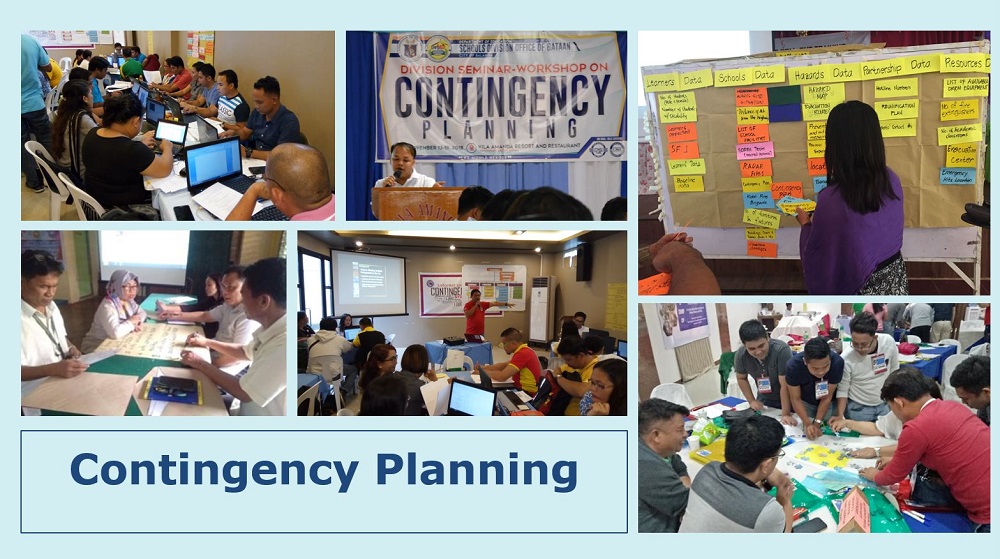
October 21, 2021 Thursday

Contingency planning is important as it sets guidance on how to respond in the event of an emergency or disaster, and helps schools to resume normal activities as quickly as possible. Photo from the presentation of Ms. Monalyn Bermijiso of DepEd Disaster Risk Reduction and Management Service.
MANILA, 22 October 2021 — The 67th episode of “Stories for a Better Normal: Pandemic and Climate Change Pathways” highlighted the ways the Department of Education (DepEd) instills and practices disaster risk reduction and preparedness in all its offices, schools, and for learners and personnel.
The online conversation conceptualized and hosted by three-term Senator, now Deputy Speaker and Antique Representative Loren Legarda, with CCC Commissioner Rachel Herrera as co-host, featured guests including Dir. Ronilda Co and Ms. Monalyn Bermijiso of DepEd Disaster Risk Reduction and Management Service (DRRMS); Mr. Glenn Sabido from the Schools Division Office (SDO) of Iloilo; Ms. Ghia Ureta from Alasasin Elementary School, SDO Bataan; and Ms. Johannna Mae Sitchon from Panabo City National High School, SDO Panabo City.
“Sa gitna ng iba’t ibang panganib na dala ng mga natural hazards tulad ng bagyo, matinding tagtuyot, lindol, o pagputok ng bulkan, mahalaga na ang ating mga public schools o paaralan ay nasa ligtas na lugar. Kaya dapat ay mayroon tayong risk mapping at risk assessment sa bawat paaralan at bawat local government unit. Ang istruktura ng ating mga paaralan ay kailangang disaster-proof at akma sa local hazards. Ang mga mag-aaral, guro, at mga staff ng paaralan ay kailangang handa rin sa kung ano mang pwedeng mangyari, in the case of a disaster,” said Deputy Speaker Legarda.
The guests shared their initiatives in helping students understand the whys and hows of disaster preparedness and emphasized the importance of making schools and communities adaptive and disaster-resilient.
“Ang ating vision ay maging resilient ang ating mga learners and enjoy and exercise their rights to be safe and protected. Ang learners natin ay vulnerable, pero they are also actors of risk reduction and resilience. Sa ating preparedness ay may meaningful participation ang mga bata, and our personnel act as enablers and support to our learners. Ang ginagawa natin ay system-wide approach, hindi lang sa isang opisina, kundi sa lahat ng levels of governance,” said Dir. Co.
“Paano nga ba natin itinuturo sa mga paaralan at sa ating mag-aaral ‘yung kultura ng paghahanda? Una ay ang pag-integrate natin sa ating curriculum. Based sa ating K-12 curriculum guide, pumapasok ang DRR topics sa mga subjects na: Science, Health, at Araling Panlipunan. Dito natin napag-aaralan ‘yung mga factors na nakakaapekto sa pagbabago ng klima, ano ang dapat gawin ng mga mag-aaral before, during, and after natural hazards, anu-ano ang nilalaman ng GO bag, at ano ‘yung mga survival skills na kailangan nating matutunan,” said Ms. Bermijiso.
“One of our best practices in Iloilo is the Batang Empowered and Resilient Team (BERT) program. Ito ay grupo ng mga estudyante na kung saan ay nagfa-facilitate ng peer-to-peer teaching of DRRM sa kani-kanilang schools. Sila rin ang in-charge sa student-led school watching at hazard mapping kung saan pini-present nila ang result sa kanilang school planning team to be integrated in their school improvement plan and their annual investment plan. They also serve as focal persons of learners in planning for a safe school, and the one promoting child-centered DRRM in school,” said Mr. Sabido.
“When the COVID-19 pandemic came in, we strategized to create immediate and timely responses to the current health crisis. These include the procurement of emergency response equipment and sanitation materials, availability of isolation room with emergency response equipment, as well as outlining our COVID-19 IATF-aligned school health protocols," said Ms. Sitchon.
“Relative to the efforts of managing disasters in the country, we believe that Alasasin Elementary School has a tangible role in building our community as a resilient learning environment. We plan and commit efforts to create a conducive learning atmosphere and process to enable our learners to develop their full potentials, morals, and skills needed for themselves, their communities, and the country,” said Ms. Ureta.
As an online discussion to promote health, environmental consciousness, and climate-adaptive practices, "Stories for a Better Normal" aims to change the mindset of individuals, families, and communities by demonstrating ways in which a ‘better normal’ can be realized within our communities.
This online discussion is organized in partnership between the Office of Deputy Speaker Legarda and the Climate Change Commission, with support from the Department of Education, Philippine Information Agency, Institute for Climate and Sustainable Cities, The Climate Reality Project-Philippines and Mother Earth Foundation.